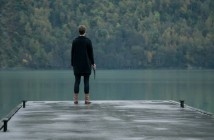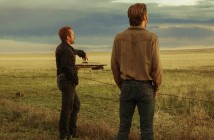
Cast: Anna Karina, Michel Subor, Henri-Jacques Huet
Director: Jean-Luc Godard
Country: France
Genre: Drama | War
Editor’s Notes: The following review is part of our coverage for TIFF’s Godard Forever: Part One which runs from January 23rd to Feburary 13th at TIFF Bell Lightbox. For more information on upcoming TIFF film series visit http://tiff.net and follow TIFF on Twitter at @TIFF_NET.
Jean Luc-Godard’s second film is a lot more serious than his sensational debut À Bout de Souffle (Breathless). It is heavily influenced by the existential philosophy of the era, as well as exemplifying the French New Wave style that would make him famous.
The story is told from the point of view of Bruno, a French soldier living exiled in Geneva in order to escape the Franco-Algerian war. Bruno is working for some mysterious French intelligence figures that insist that he kills a sympathizer of the Algerian nationals (FLN) called Palivoda to prove that he is not a double agent. He knows that he has no choice so he begrudgingly agrees; yet in the meantime he meets a model named Veronica, who turns out to also work for the FLN.
It is heavily influenced by the existential philosophy of the era, as well as exemplifying the French New Wave style that would make him famous.
When his attempts to carry out the assignation fail, he tries to elope to Brazil with Veronica, yet his plans are foiled when he is captured and tortured in order to give her up. He resists the torture and escapes but learns that Veronica has got into trouble of her own…

The film still packs a punch 50 years after it was first released, primarily because of the torture scenes. Even if they are filmed with a ‘60s chic, they are still pretty powerful due to prolonged shots of primitive waterboarding and electrocution / burning. The scenes where Bruno (a European Johnny Depp) has been kidnapped show his captors calmly torturing him whilst gleefully turning up the jazz music on the radio – a kind of early precursor to Reservoir Dogs. The film was banned on first release due to these scenes – and they still make you wince half a century later.
The film is primarily about storytelling, with long scenes focused on characters telling long-winded jokes or reading from books, and is a damning indictment on war. At one point a character states that “We went to war like children went to school” – which painfully reflects the tensions in the world in the mid 20th century.
The film still packs a punch 50 years after it was first released, primarily because of the torture scenes. Even if they are filmed with a ‘60s chic, they are still pretty powerful due to prolonged shots of primitive waterboarding and electrocution / burning.
Bruno himself though is quietly sophisticated: at one point he visits Veronica to take pictures of her and they end up having an argument about the classical music they should listen to. He claims that, ‘Bach is for 8AM… Beethoven is profound and is for midnight, whereas Mozart is for 8PM’ so they agree on Haydn for their midday photo-shoot. The photo-shoot itself incidentally is an echo of the whole Nouvelle Vague style: improvised, with natural lighting and plenty of philosophy and eye contact.
[notification type=”star”]71/100 ~ GOOD. The film is primarily about storytelling, with long scenes focused on characters telling long-winded jokes or reading from books, and is a damning indictment on war. [/notification]



